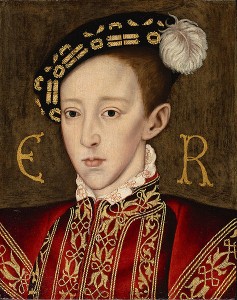 On this day in history, fourteen-year-old King Edward VI fell ill. His journal entry for 2nd April 1552 reads "I fell sike of the mesels [measles] and the small pokkes [smallpox]",1 but he doesn't mention it again in the entries for that month and he was still able to write entries.
On this day in history, fourteen-year-old King Edward VI fell ill. His journal entry for 2nd April 1552 reads "I fell sike of the mesels [measles] and the small pokkes [smallpox]",1 but he doesn't mention it again in the entries for that month and he was still able to write entries.
In a letter to his friend Barnaby Fitzpatrick written on 3 May 1552, Edward mentions his recent illness:
"We have a little been troubled with the smallpox, which hath letted us to write hitherto; but now we have shaken that quite away."2
on 12th April, the imperial ambassador, De Courrières, recorded: "I arrived here on the evening of the 12th instant, and the next morning the ambassador and I sent to the Duke of Northumberland to inform him of my arrival and demand audience. He replied that I was very welcome, and informed us that the King had recently had the measles, and was not yet quite recovered, so he feared audience might not be given for five or six days". He also added a post-script following a meeting with Philip Hoby:
"P.S.— After the above was written, the Council sent Mr. Hoby to tell me that the King was not quite recovered from the small-pox, and as he still bore some marks on his face, he did not wish to show himself to strangers. Hoby therefore saw little chance of my obtaining audience for ten days. He begged me to be patient, but said that if my charge was urgent I might come to the Council to declare it and discuss it with them, until I should be able to make a more ample declaration to the King, when restored to health. I replied that if it pleased the Council I would wait three or four days more to see whether the King would then be well enough to permit me to present my duty to him. Hoby undertook to transmit this message to the Council."3
So, just twelve days after being taken ill, Edward is said to be recovering.
On 21st April 1552, Edward's half-sister, Elizabeth, wrote to the king regarding news of his illness:
What cause I had of sorrow, when I heard first of your majesty's sickness, all men might guess, but none but myself could feel, which to declare were or might seem a point of flattery; and therefore I omit to write it. But, as the sorrow could not be little, because the occasions were many, so is the joy great to hear of your good escape out of the perilous diseases. And, that I am fully satisfied and well assured of the same by your grace's own hand, I must need give you my most humble thanks, assuring your majesty, that a precious jewel at another time could not so well have contented, as your letter in this case hath comforted me. For now do I say with Saint Austin, that a disease is to be accounted no sickness, that shall cause a better health when it is past, than was assured afore it came. For afore you had them, every man thought that that should not be eschewed of you that was not escaped of many. But since you have had them doubt of them is past, and hope is given to all men, that it was a purgation by these means for other worse diseases, which might happen this year. Moreover, I consider that, as a good father, that loves his child dearly, doth punish him sharply, so God, favouring your majesty greatly, hath chastened you straitly; and, as a father doth it for the further good of his child, so hath God prepared this for the better health of your grace.
And, in this hope, I commit your majesty to His hands, most humbly craving pardon of your grace that I did write no sooner; desiring you to attribute the fault to my evil head, and not to my slothful hand. From Hatfield, this 21st of April.
Your majesty's most humble sister
to command,
ELIZABETH."4
This was just nineteen days after Edward had fallen ill and Elizabeth is apologising for not replying to him sooner, mentioning that she heard from Edward himself of his recovery. This shows that Edward recovered quite quickly from the disease(s). Edward was very lucky; smallpox was a serious disease and it would have been even worse when combined with measles. However, fast-forward a year and Edward was just three months from death, having been taken ill in January 1553. Edward's biographer, Chris Skidmore, believes that this April 1552 bout of illness suppressed Edward's immune system and so led to him dying of what is thought to have been tuberculosis on 6th July 1553.
Also on this day in history, on 2nd April 1502, Arthur, Prince of Wales, died at Ludlow. Click here to read more about Arthur.
Notes and Sources
- ed. Nichols, John Gough (1857) Literary remains of King Edward the Sixth. Edited from his autograph manuscripts, with historical notes and a biographical memoir, Volume the Second, p. 408. Read online at https://archive.org/stream/cu31924091758312#page/n215/mode/2up
- ed. Nichols, John Gough (1857) Literary remains of King Edward the Sixth. Edited from his autograph manuscripts, with historical notes and a biographical memoir, Volume the First, p. 79-80. Read online at https://archive.org/stream/literaryremains00clubgoog#page/n469/mode/2up
- 'Spain: April 1552', in Calendar of State Papers, Spain, Volume 10, 1550-1552, ed. Royall Tyler (London, 1914), pp. 497-508. British History Online http://www.british-history.ac.uk/cal-state-papers/spain/vol10/pp497-508
- ed. Green, Mary Anne Everett (1846) Letters of royal and illustrious ladies of Great Britain, from the commencement of the twelfth century to the close of the reign of Queen Mary Volume III, p. 225-226. Read online at https://archive.org/stream/lettersroyaland06greegoog#page/n244/mode/2up



Leave a Reply